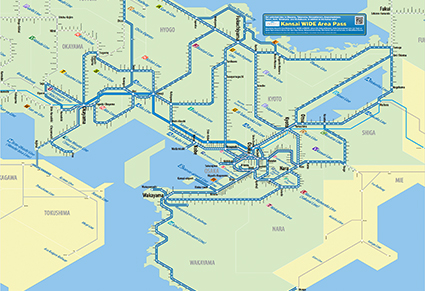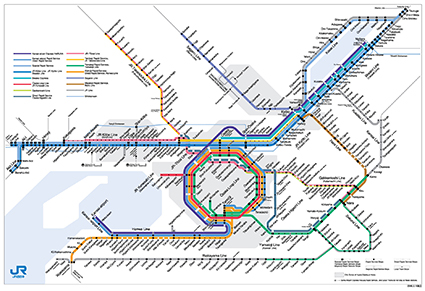
Office Space in Kobe, Osaka
Finding the right office and understanding leases in Kansai, Japan
We support foreign companies in their search for office space within Kobe, Osaka Area.
We provide detailed guidance about office locations, business practices of the office lease market in Japan, the criteria of the tenant screening process put forth by building owners or lessors and more.
Choose the location that is right for your business
Location is perhaps the most important factor when deciding where to set up your business. It is important to consider the needs of your office space and prioritize them.
Here are some of the fundamental necessities to consider: accessibility to clients, proximity to major hub stations and airports (Kansai International Airport and Osaka International Airport (Itami Airport)), walking distance to the nearest station, employees' commuting time and fees, rush hour traffic on a specific train line, proximity to banks and post office, and nearby dining options. All of these factors will affect the smooth operation of your business in different ways.
Area distribution by business type in Kobe and Osaka
| Finances | Sannomiya (Kobe), Kitahama (Osaka) |
|---|---|
| Lawyers | Sannomiya (Kobe), Nishitenma (Osaka) |
| Pharamaceutics | Sannomiya (Kobe), Sakaisuji (Osaka). Honmachi (Osaka) |
| Consulting | Sannomiya (Kobe), Umeda (Osaka) |
| Apparels | Sannomiya (Kobe), Shinsaibashi (Osaka) |
| IT, Media | Sannomiya (Kobe), Umeda (Osaka), Dojima (Osaka) |
Office Lease Types
Serviced Office

Ranging from furnished small cubicle style rental offices with shared meeting rooms and facilities to high-end office buildings with bilingual secretarial services in prime locations. Generally, these properties are available for short-term contracts and enables tenants to save on the initial investment costs for interior layout construction and office infrastructure setup.
Serviced Office properties are recommended for companies:
-
seeking a short-term rental property
-
in the process of establishing or setting-up businesses for their company
-
seeking small-scale offices for networking or wishing to outsource reception work
-
when the number of employees and amount of incoming business is fluctuating
-
seeking a temporary office for a project
-
seeking a space for recruiting and interviews
Ordinary Office Space

Recommended for companies seeking a more consistent and long-term business base. The size of such an office can range from as small as 30 sqm. to over 3,500 sqm. Ordinary office spaces can vary from small sections within a building to an entire building. The conditions, form, and terms of an agreement vary depending on the owner and the size of the property.
When deciding on an office space, some aspects to consider are:
-
Other occupants (any signs of crime syndicates, troublemakers, etc.)
-
Size and impression of the entrance
-
Efforts made towards earthquake resistance, capability to continue business under emergency situations (availability of back-up power generators, etc.) Disaster planning and evacuation route
-
Type of A/C, available hours, extra fees for A/C use outside of the pre-determined A/C operation hours
-
Security
-
Height of the ceiling (Old Japanese buildings often have low ceilings; which is not suitable or practical for Westerners.)
-
Shape of the property (Shape of the space, placement of pillars, etc.)
-
Business hours of the building (availability at night, weekends and holidays, etc.)
-
Restrictions on interior decorating/construction venders
Understanding the Lease

Terminology
Security Deposit (Shikikin, Hoshokin)
This is a refundable payment made to the lessor once a lease contract has been agreed upon. This amount to be refunded at the end of the lessee’s tenancy. The amount to be returned when vacating the property is calculated by deducting the ‘Restoration Fee’, ‘Fixed Amortization Fee’ (if applicable), and a general cleaning fee. Once the aforementioned fees are deducted, the remainder will be repaid to the lessee, usually within 3 weeks to 1 month from vacating the property.
Market Average :
For small to mid-size office ; 4-10 times monthly rent
For mid-size office or larger size office; 6-15 times monthly rent
Fixed Amortization Fee (Shoukyakuhi)
A non-refundable payment to the lessor, usually deducted from the security deposit when vacating an office.
Market Average : 0-2 times the rent, 0-20% of deposit
Renewal Fee (Koushinryou)
A non-refundable payment to the lessor, usually payable upon the renewing of a lease's terms.
Market Average: 0-1 times the rent.
Rent (Chinryou)
Usually expressed in both tsubo* (3.3 sq.m.) and sq.m. bases. Please check whether or not the nominal rent includes the management fee.
*TSUBO (Unique unit basis for area measurement) 1 tsubo is equal about 3.3 square meters, and the rental rate for office space is usually expressed in a "per tsubo" basis in Japan. Adapting to the tsubo measurement may enable you to understand a lessors’ leasing logic better, since profitability is usually calculated on a per-tsubo basis. 1 tsubo equals twice the size of 1 traditional tatami mat.
Management Fee (Kanrihi)
A fee usually insisted upon as it covers monthly expenses such as utilities and the cleaning of public spaces and elevators. Unlike the nominal rent, most management fees are rarely negotiable when it comes to decreasing the amount or waiving the management fee altogether.
Free Rent Term
A period that a lessor agrees to lease an office space rent free. In the event that rent consists of a combination of a nominal rent and management fee, a standard definition of ‘free rent term’ excludes the nominal rent part only, and the Lessee is still liable for the management fee throughout the term.
Sales Tax (Shouhizei)
Excluding organizations such as embassies, consulate offices, or other public or military service offices of foreign countries, all office lessees need to pay sales tax on rent, management fees, fixed amortization fees, key money, and renewal fees. The current tax rate is 8%.
Type of Lease Agreement (Contract)
Normal Rental Agreement (Renewable):
A Normal Rental Agreement is usually a 2-year renewable contract. Sometimes a renewal fee is charged upon the renewal of an agreement.
Fixed-Term Rental Agreement (Not renewable):
The rental agreement is terminated on the expiration date of the agreement. The agreement can be re-contracted only if both lessee and lessor agree. Most medium and large scale offices and rental offices owned by major companies use this type of rental contract.
Membership sign-up:
For short-term (one month to two years) serviced offices and rental offices, it is common to ask for a membership sign-up that allows all members to have access to the space.
Tenant Screening by Lessor

When a Foreign Corporation Rents an Office in Japan
Having years of experience with lease contracts for foreign corporations, we are able to provide matching services between flexible office properties and our customers.
There are however cases in which the lessor declines a tenant's application due to various tenant qualifications not being met such as: a foreign corporation which is establishing an office in Japan for the first time, a corporation that has an insufficient business history in Japan, a corporation whose representatives or officers are of foreign nationalities, a corporation which cannot have a cosigner for a lease contract, etc.
In such cases, we suggest that a customer submits documents that will help facilitate the lessor’s screening process; especially those that help with determining the financial condition and size of a business, such as the financial statements of a head office in a home country (or a whole group companies).
The following documents may be necessary:
-
A Business plan (including the financial management plan) in Japan
-
Financial statements (usually for 3 years)
-
Actual purchase order sheets and business partner or customer information about the business in Japan
-
Summary of qualifications and work history of the person actings as the representative in Japan
-
“Financial support letter” to Lessor confirming that a head office in a home country shall guarantee all payments of an office in Japan.
In addition to these documents, extra safeguards such as an advance payment of rent or an additional deposit may be required to pass a screening.
Please feel free to contact us
Maeda Real Estate
Intl. Leasing & Management Div.
Weekdays 9:30am-5:30pm
+81 78-858-0810




